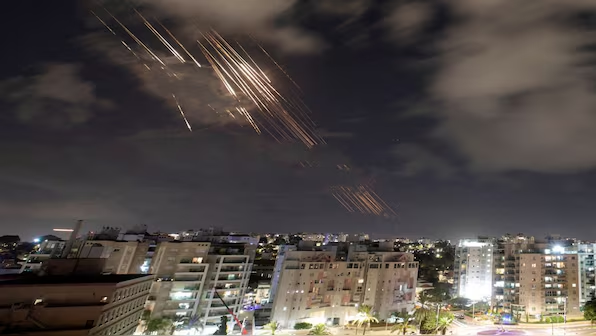
By YaHind.Com News Desk
In a dramatic escalation of tensions in the Middle East, Iran launched over 100 drones targeting Israel on June 13, 2025, in retaliation for a series of devastating Israeli airstrikes on Tehran and other strategic sites across the country. The Israeli operation, codenamed “Operation Rising Lion,” targeted Iran’s nuclear facilities, military leadership, and ballistic missile infrastructure, marking one of the most significant military engagements between the two nations to date. The region now teeters on the brink of a broader conflict, with global powers urging restraint.
Israel’s Preemptive Strikes: Operation Rising Lion
The Israeli Defense Forces (IDF) initiated Operation Rising Lion in the early hours of June 13, deploying over 200 fighter jets to deliver more than 330 munitions across 100+ targets in Iran. The operation aimed to cripple Iran’s nuclear program and military capabilities, driven by intelligence suggesting Iran was close to achieving nuclear weapon capability. Key targets included:
- Natanz Nuclear Facility: Israel struck Iran’s primary uranium enrichment site, damaging underground centrifuge halls. The International Atomic Energy Agency (IAEA) reported no radiation leaks, and Iran’s Bushehr Nuclear Power Plant and Fordow facility remained untouched.
- Military Leadership: The strikes killed several high-ranking Iranian officials, including:
- Gen. Hossein Salami, commander-in-chief of the Islamic Revolutionary Guard Corps (IRGC).
- Maj. Gen. Mohammad Bagheri, chief of staff of Iran’s armed forces.
- Gen. Gholamali Rashid, deputy commander of joint forces.
- Gen. Amir Ali Hajizadeh, head of the IRGC’s Aerospace Force.
- Nuclear Scientists: Six key scientists, including Fereydoon Abbasi, former head of Iran’s Atomic Energy Organization, were killed, significantly disrupting Iran’s nuclear research.
- Ballistic Missile Sites: Facilities in Isfahan and other regions were hit to hinder Iran’s missile production capabilities.
- Other Targets: The IRGC headquarters in Tehran and air defense systems were also struck, with reports of civilian casualties, including women and children, in residential areas.
Israeli Prime Minister Benjamin Netanyahu defended the strikes, stating, “Iran’s nuclear ambitions threaten Israel’s survival. Operation Rising Lion is a necessary step to ensure our security and prevent a nuclear-armed Iran.” He claimed Iran had enriched enough uranium for “nine atom bombs” and vowed to continue the operation for “several days” to neutralize the threat.
Iran’s Retaliatory Drone Attack
In response, Iran launched over 100 Shahed-136 explosive drones toward Israel. The IDF reported intercepting many of these drones outside Israeli airspace, with assistance from Jordanian and Saudi air forces. Iraq also confirmed that over 100 drones crossed its airspace, some of which were neutralized to prevent collateral damage. Iran’s Supreme Leader Ayatollah Ali Khamenei condemned the Israeli strikes as “barbaric” and promised a “harsh response,” accusing Israel of targeting civilian areas. Iran’s Foreign Ministry held the United States, Israel’s primary ally, accountable for the consequences.
To fill the leadership vacuum, Khamenei appointed Gen. Ahmad Vahidi as the new IRGC commander. Iran also announced plans to activate a previously undisclosed uranium enrichment site and accelerate production of 60% enriched uranium, a move that could bring it closer to weapons-grade material.
Regional and International Responses
The international community has reacted with alarm to the escalating conflict:
- United States: President Donald Trump praised Israel’s operation but urged Iran to “come to the table” to avoid further escalation. The U.S. denied direct involvement, though its role in providing intelligence or defensive support remains unclear.
- Jordan and Iraq: Both nations closed their airspace and actively intercepted Iranian drones to protect their territories.
- Taliban (Afghanistan): The Taliban called for de-escalation, reflecting Iran’s diplomatic ties with Kabul.
- Russia: Despite a military cooperation agreement with Iran, Russia is unlikely to intervene directly due to the absence of a mutual defense clause.
- Australia: Prime Minister Anthony Albanese expressed concern over the risk of nuclear escalation and called for diplomatic efforts to resolve the crisis.
- United Kingdom: Reports suggest Britain will not assist Israel in defending against Iran’s retaliation, signaling a cautious approach.
Regional Implications
The strikes and counterattacks have heightened fears of a wider regional conflict. Jordan, Iraq, and other neighboring countries have closed their airspace, disrupting commercial flights and signaling heightened security concerns. Iran’s allies, including Hezbollah and other proxy groups, may be mobilized in response, potentially expanding the conflict to Lebanon, Syria, or other areas. Israel’s advanced air defense systems, including Arrow and David’s Sling, remain on high alert to counter further Iranian attacks.
Global Concerns
The targeting of Iran’s nuclear facilities has raised alarms about the potential for environmental and humanitarian consequences, though the IAEA’s confirmation of no radiation leaks has eased some concerns. The deaths of key military and scientific figures could weaken Iran’s capabilities in the short term but may also galvanize hardline factions, potentially leading to further escalation. The international community, particularly the U.S. and European nations, faces pressure to mediate and prevent a full-scale war.
Conclusion
The Iran-Israel conflict has entered a dangerous new phase, with both sides demonstrating their willingness to escalate militarily. Operation Rising Lion has dealt a significant blow to Iran’s nuclear and military infrastructure, but Iran’s drone retaliation and vows of further action suggest the conflict is far from over. As the region braces for potential further strikes, the international community must prioritize diplomacy to prevent a catastrophic escalation.
Stay tuned to YaHind.Com for updates on this developing story.



